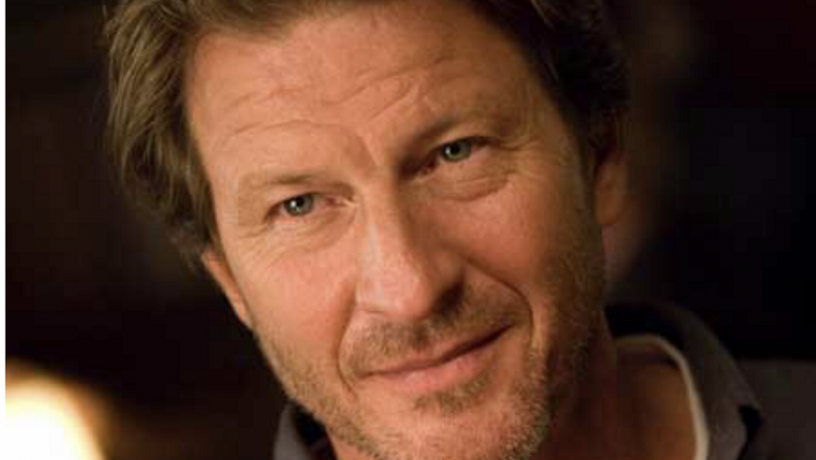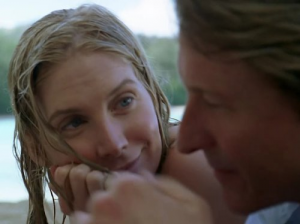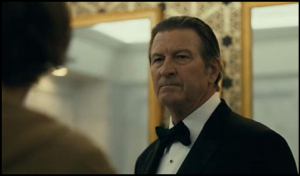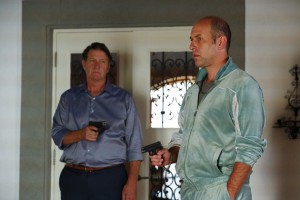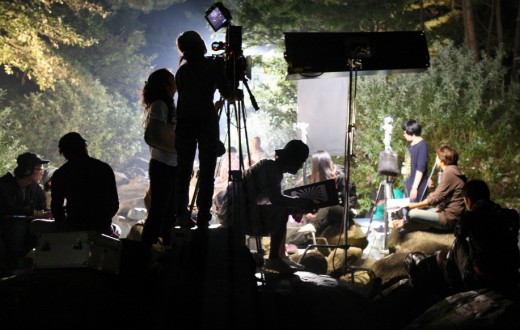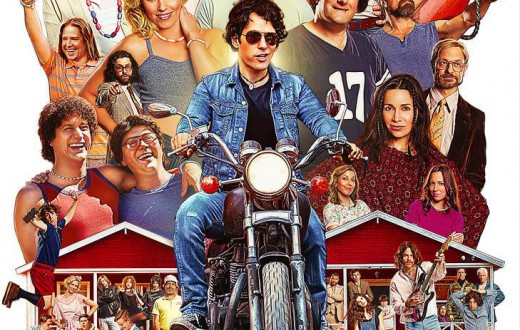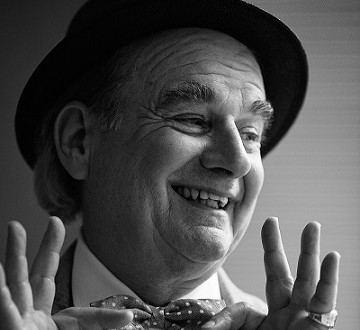Joker Actor Brett Cullen has what we, as actors, strive for: a long, distinguished acting career which consists of actual acting.
Brett Cullen, who played Batman’s father Thomas Wayne in the Joker film, shares the knowledge and lessons he learned from several people over the years – people he refers to as geniuses, which is something you’ll agree on after reading this interview.
What’s the difference between acting and telling a story?
I’m not sure if there is such a great difference between the two since every character has a story arc and generally, a beginning, middle and end. As we do in life. So as actors we are telling ‘our’ story within the play or script. A director is blending every character’s stories to tell his story. So I’m not sure there is a big difference. Everyone of us have as a purpose. As an actor, mine is to bring to life a three dimensional believable character that lives and breaths. And the director’s job and a producer’s job is to tell the story of all these characters interacting with his or her point of view. To visualize it, think of a story as a skeleton, and the whole story is the entire spine and limbs. The actors have their own “spine” that connects to the skeleton and is one part of the whole. I hope that makes sense. Haha!
You graduated from the University of Houston in 1979 where you met your acting mentor and professor, Cecil Pickett.
a) What was the best piece of advice he gave you?
Mr. Pickett told me once that when I was in my 40’s I wouldn’t have to act so much. I asked him why? I will be so successful? He said no, you will have life experience. You will hopefully be married, have children or the loss of siblings, parents or friends. You emotional life will soooo much easier to access. And he was right. 1000%.
b) What was so special about Cecil Pickett that he made such an impression on you?
Mr Pickett was one of two geniuses I was fortunate enough to have been trained by. He taught us our craft. We studied Stanislavsky and also used Uta Hagen’s book. He gave me a craft that I use to this day. He also said study with everyone. And I’ve tried. He said you will learn things that are helpful and things that don’t work for you. Use what works. Whatever makes you a better actor and helps you learn every day is paramount. The craft. Your craft will be what you can fall back on when you’ve shot for 18 hours and you’ve delivered that take that was perfect but the camera operator or focus puller missed it. You have to do it again… it’s frustrating and upsetting but you have to do it again and be in the moment and be truthful. It’s your craft that will be the thing you fall back on. And it’s the same in the theater. I once played Treplev in The Seagull when I was a young man and I was sick as a dog. I went onstage with a fever and was very sick. My castmates said you were so good tonight. I could hardly remember it but what I believe happened is my craft took over, and I lived what all my preparation and hard work had given me and was just in the moment. Sometimes things happen but you have go forward. It’s your job and your craft will hold you up. It’s all about your craft. And Mr Pickett taught me all of this. He also demanded when you walked into the theater for class or rehearsal you leave all your BS at the door. It was time to work and also expected you to be there 15 minutes early so you will be ready when 7pm rolled around. That was his time and you’d better be ready to work. I was once three minutes late for a rehearsal to Mack and Mabel… I couldn’t find parking and apologized profusely. He wouldn’t accept it. I said, “Mr. Pickett, I was only three minutes late.” He said, “No. There are 25 cast members here plus me and the crew. You wasted three minutes of all of our time.” I was NEVER late again. Ever.
Elizabeth Mitchell and Brett Cullen in TV’s Lost
During our phone conversation, you mentioned Kim Stanley, the actress who attended the Actors Studio in New York City. You said she “changed my perspective about being in the moment”. How and where did you meet Kim? How did she change your perspective about being in the moment? What exactly does that mean?
I met Kim Stanley in Los Angeles through two friends of mine who studied with her. She changed my perspective on how to approach my work. In her class you worked on your work and your ‘need’ in a scene and on the character. But she also wouldn’t let you go to the text until she felt you understood your character’s “need”. I once asked her why we can’t say the words and her response was, “Are you a playwright?” I’m not. And she said then just try to act then. Her belief was that by the age of 18 you feel every emotion every day in whatever minute form. She wanted you to be in the moment and have the ability to access your emotions in real time. She didn’t want you thinking about when your grandfather died or when you dog was hit by a car to access those emotions. She wanted you to be in the here and now. She taught me how to emotionally attach yourself to the character. So that what you are doing in actions and words are real to you. At least that’s what I learned from working with her. It changed my approach to my craft. She was the second genius I had the honor to study with. Mr Pickett and Kim Stanley… amazing teachers. And I’m thankful I was able to study with them both.
You teach master classes and run a program at the University of Houston. What’s the name of the program? How was it started and who is eligible to attend? Do you bring guests to talk at the program?
I teach privately out of my home to a small group of students but because of my schedule I have a rough time keeping a consistent schedule. But I love sharing with young actors what I’ve learned and what I’m still learning. The great quote that I heard recently(and I apply this to theater and film) was “You know what’s great about being an actor? You get to try and be better tomorrow.” So I teach when I’m on location sometimes. I do a master class or teach at my alma mater the University of Houston. I deeply believe that I was given a career at that school and I think the most important thing to do is to give back. Share your knowledge and try to learn something every day. So with the help and generosity of Renu Khatour and Paula Short, the President of U of H and the Provost, they helped me create a guest artist program at the school for the Theater department. We started the program this year. I took Tom Irwin, one of the founding members of The Steppenwolf Theater company in Chicago, as the first guest artist this year. In the coming weeks I’m taking Lisa London, a well known casting director, to teach an on camera audition class and self taping class which I think will be extremely helpful. Who inspired me to do this was Sydney Berger, the chairman at U of H when I attended, who was a genius. He brought in Jack O’Brien, Vinnette Carroll, Frank Corsaro, Bobby Lewis, Adrian Hall, John Houseman’s The Acting Company, the Royal Shakespeare Company, and Peter Brook’s French acting company who all taught and inspired us. It was the greatest learning experience because the opened our eyes to what is expected in the real world and this inspired me to try and do the same.
What is your affiliation with Sally Mayes, the Broadway actress and Tony nominee, who also attended U of H? What makes you two click?
Sally and I attended the University of Houston together and did musicals together. Now she can SING and act, I could act and sing a little hahahaha… but we graduated and went to different coasts. But we stayed in touch. She was doing Broadway and I was working primarily in TV and film. But we maintained our friendship over these past decades thankfully.
When Sally Mayes asked you to produce a play she was working on, you told her you should direct. What made you say that? Was directing something you’ve always been interested in or was it said on a whim to see where things would lead?
I did a fundraiser for the undergraduate theater scholarship program we set up years ago in Cecil Pickett’s name. So I got a bunch of people to come and perform who were graduates of U of H… Brent Spiner, Robert Wuhl and Sally, Billy Stritch and Sharon Montgomery who had this amazing trio years ago. So they reunited and I think Sally saw how I produced that and she told me about this idea she had been working on. She asked if I would be interested in it and I said let me read it. And over a four year period she took her idea with my notes and a few close friends in NYC and fashioned a brilliant play. Once I saw where it was going I agreed to produce it but that I also wanted to direct it. She said why do you want to direct it? The play is about her mother passing from Dementia and her going home to box up her mother’s home. The memories and the fear her character may have this dreaded disease. My mother passed away from the same disease and I felt I had something to add as a director. The piece is a very private and personal story. And I know Sally really well and told her that I want to make her really find the pain and rawness of having dealt with that in her life. And I said I was going to be tough on her and not let her phone anything in. And I didn’t and most of all the credit goes to her. She was so committed and truthful. Every night we’d both be crying as I would direct her in a particular moment and we’d both laugh because there we were in rehearsal but still raw from the loss of both our moms, bawling our head’s off. That was a workshop production which, by the way, is a musical with 10 songs. I believe we will be taking it back to Houston to remount it in an Equity theater there in hopes of bringing it to off-Broadway. Fingers crossed.
Your interest in show business is very diverse, with acting, producing, directing and teaching. Do all four of these titles come together full circle for you, or are each their own entity?
I love to act, it’s my passion. I’ve produced a few things and discovered I’m actually pretty good at it and I have found I enjoy directing. As for teaching, I’m not in the league of such geniuses as Mr. Pickett or Kim Stanley, but I want to give back and my knowledge and my pursuit of my own growth I think is invaluable to young artists preparing to go out into the real world. I love doing them all but acting is my passion and I will always do that. But producing, directing is a different challenge that is very exciting and I enjoy it immensely. And teaching is amazing because I learn working with young actors and hopefully they learn from me. So I can jump back and forth from one to the other and not feel like I’m missing out on anything. I try to learn from my work, the students and life. The day I stop learning put me six feet under.
We often hear that actors should use personal experiences to help them build a character. Is this something you agree with and use?
Well that’s complicated but I ask students to do two things before starting to develop a character. One, read the play or screenplay without your character in it. Then you will see the whole that’s left in the piece that your character needs to fill. Secondly, I tell them to get a notebook and write down these three things: what the playwright says about your character, what the other characters say about your character and finally what your character says about himself. Once you’ve done that then start to have a more complete idea who you are creating. Then you start to fill in the envelope that slowly becomes the character you develop. I feel then an actor has to bring his emotional life as well as physical characteristics to bear on the role. I can’t imagine not bringing your life, your personal experiences into building a character but that is driven by the playwright / screenwriters words and your director. And as I stated Kim Stanley taught me to access my emotional life in the moment, Mr. Pickett taught me how to build a character and how to truly study a play and have a firm grasp of his character’s spine and with a director’s help the spine of the play. Basically building a physical presence and filling it with true real emotion so the audience feels like they are experiencing this characters’ struggles over the obstacles they have to overcome or not overcome.
Brett Cullen as Thomas Wayne in Joker.
You’ve been in some very high profile films such as The Dark Knight Rises and most recently Joker with Joaquin Phoenix. Was there a non disclosure agreement (NDA) you needed to sign?
Yes, some projects require you to sign a non disclosure agreement… and the social media conundrum with the young artists today feeling the need to announce to the world what they are doing. I’d suggest you let the work speak for itself and once it’s out you then can post whatever you want. Also to never talk about a project you are shooting other than to say I’m shooting Joker for instance. I just said that and people would start asking me questions and truthfully not being able to say anything or posting anything makes it more mysterious and interesting in my mind. But if a production wants you to post about it and generate interest then by all means do it. I just prefer to do my work then go hang with my family and friends.
You can recently be seen on NBC’s The Blacklist with James Spader. Did you audition for the role? Who broke the news to you that you had the part?
I’m excited to be on The Blacklist. It was an offer so I was fortunate enough not to have to read for it. It’s been a great experience and hope to work with them again. Great cast, great crew and the directors have been wonderful. The producers have been very accommodating with my schedule and very kind to me. Love working with James. He’s such a smart talented artist.
Early on in your career, you were in a television show with Bill Bixby called The Incredible Hulk, which was developed by Kenneth Johnson. Later you were in another Ken Johnson series called “V”. Was that coincidence or were you asked to be in “V” because Ken Johnson remembered you from The Incredible Hulk? Is it common for Directors to cast actors they’ve previously worked with? Tell us about working on those two shows.
The Incredible Hulk was a great experience because Bill Bixby gave me some great advice. He told me to always expect when success hits, your feet won’t touch the ground for a few months. But then you come back to earth and you realize the garbage still has to be taken out. I love that idea. Being famous or being successful has nothing to do with what kind of man or woman you are. Or how you are as a good father or husband or wife or partner. You can’t let the machinations of the industry shape you. You family does that, your friends do that, and it keeps you grounded. V was fun to work on because I was a big fan of a Marc Singer. So that was a thrill for me. But I don’t think being on one show was the reason I was cast in the other. But it probably didn’t hurt that I’d worked with Mr Johnson before. But I can’t say that’s the reason. Who knows… just happy I got a job.
Where and when did you meet your wife, Michelle Little? How did you know you’d be able to support a family on an acting career?
Michelle is an extremely talented actress in her own right. We met at a barbecue at a friend’s house. She was shooting her first movie and I was doing an Australian play by David Williamson at the Santa Monica Playhouse. We had the same agent and that’s how I found her after that day. We both were in Apollo 13 and had the extreme pleasure of working with an amazing cast and Ron Howard. Michelle got pregnant on that film and made the decision to raise our daughter. Sometimes I think she wished she’d kept working but when she brought it up I said I will support her in anything she decides. I was already working fairly steadily and knew I could support us on my salary alone. So that’s what happened. Late last year while I was shooting True Detective for HBO, I got a call from my friend who was a producer. He asked me if I could do their film. I said well we need to see if HBO will cut me loose for a few weeks. Then they called up and asked if Michelle still acted because they couldn’t find an actress in Oklahoma they were happy with… so they asked if she would be able to play my wife and would she read. I said, “Yes she can play my wife and no she’s not reading.” I suggested we do a Skype call with director. We did and even when they weren’t sure if I could do the film, offered her the role. We had soooo much fun working together and she was simply amazing.
How is New York different from California for actors who are just starting out? How does one know which coast to choose to begin their career?
The difference between NYC and LA… I think being an actor in NYC you are treated with a bit more respect because it tends to be more theater centric. In LA everyone is an actor but not a lot of paying gigs in the theater. There are wonderful actors on both coasts and I don’t have an opinion on which is better or worse. Just study and keep studying and learn everyday. The craft is the key.
How one gets an agent or finds work is based on so many elements. It’s hard to advise on that but one thing I tell actors I have trained is to keep your eyes open. Don’t put blinders on and think I’m only doing films or I’m only doing theater. Sometimes doors open. A commercial or a student film. Something. Try it out. It’s a learning experience. You can always go back on the path you were on. But keep an open mind and explore whatever opportunities that come your way.
What makes a great reel?
Your reel should highlight you. When I was younger I would want the whole scene to finish and maybe because I felt it was disrespectful to cut away from the other actor. But I learned that it’s the same as an audition. You go in to show them who you are and how you’d like to play a role with about five different options in your back pocket in case the director wants you to try it a different way. Preparation is key. Same thing with a reel. It’s to highlight you and only you. So cut it that way.
Generation Z has such a different outlook on today’s world than your generation, especially when it comes to social media. What goes through your mind when you see actors being cast because of their social media numbers rather than their acting skills?
I think that’s foolish and not worth commenting on. I would never ever cast someone who had a lot of followers just for that reason. You need actors who know how to act. Ugh. Hate to even answer that question.
Your given name is Peter Brett Cullen. At what point did you decide to use Brett Cullen as your professional name?
I’ve always been called Brett Cullen since I was born. My mother picked out Peter because she was Catholic and to honor St. Peter… the only time my full name was used was when I knew I was in deep trouble because my mom would use my full name and say PETER BRETT CULLEN! Tthen I knew I was in deep trouble. Hah!
You use an iPad for work. How has technology changed the way actors prepare for their scenes? Do you read your scripts on the iPad or paper?
I prefer have the script in hand. But I’ve used my iPad when that isn’t available.
Your mother died of dementia and your brother also has dementia. When you started seeing dementia in your family, what did you do?
My mother was diagnosed years ago. She always knew me and lived with us for two years until she needed to be in a memory care unit. It was 10 minutes from my house. She passed away a little over two years ago. I miss her dearly. It’s not hereditary so I’m not concerned. My brother I’m worried about. But eventually I hope to bring him closer to me so I can help him in anyway I can.
You recently saw a show with Billy Stritch, Liza Minnelli’s musical director, in NYC. Where was this? How do you know each other?
Well, I saw Billy at the Carlyle Hotel at Bemelmans Bar with Jim Caruso [Broadway actor]. Then the next night at Birdland on 44th Street. It’s called Cast Party and it’s an open mic night. Great fun and some amazing talent gets up and performs with Billy and the band. I knew Billy in Houston at University of Houston. Been friends for a long time. Don’t get to see each other that often and that’s why when I’m in NYC I try my best to see him and Jim. Great shows.
Brett Cullen in The Blacklist Ep 705 with Gregory Konow. Photo by Will Hart NBC 2019 NBC Universal Media LLC.
What’s next for you in terms of your career?
I’m waiting to find out if a pilot I did get picked up by HBO with John C. Reilly and Jason Clark. Adam McKay directed and produced with Scott Stevens. I’m also going to New Orleans to shoot a film in December and January.
What advice do you have for actors of all ages just starting out?
Train train train and keep your eyes open and be ready to try anything you get an opportunity to do.
Anything else you want to say?
First always be nice. No one likes working with an asshole. Arrogance and cockiness are very unattractive. Be humble and gracious and thank everyone you work with. And I mean everyone. Make up, hair, crew, production assistants, etc.
I tell this story but it’s a true story and it is an important thing to remember. I will leave names out just to be respectful. My wife did a movie years and years ago in Hollywood. It was before Hollywood got cleaned up and the trailers were outside the studio lot. So there was a PA outside every trailer to make sure nothing was stolen. The PA who was watching her trailer was this nice young man from Texas. Said he graduated with his degree in law. Said he really wanted to be a writer so he left the law firm he had been hired by and came to Hollywood. They were shooting nights so I’d go and hang out with her and when she was shooting I’d stay outside with this young PA. I’d smoke and talk and I kept telling him to remember tenacity is the most important thing to hold onto out here in LA. Don’t take no for an answer keep writing…you will catch a break eventually. Well the movie ended and years later my best friend I grew up with was playing the lead in this baseball movie. I was so mad but jokingly because he never played baseball and I had. So he went to have dinner with the producer and the director/writer. The first words out of his mouth were going to be about me… saying I should be in the film. They sit… before he can say anything, the director/writer said you know who I want in this film… and my friend said no, who?
He said Brett Cullen. My friend called me later and said do you remember this guy? He was the PA on my wife’s film. And he remembered me. I was cast in the film but had to drop out eventually because of scheduling issues. We are still friendly and hopefully one day we will do something together. So… always remember. Be nice. To everyone. You never know that the student director could be the next Spielberg, Scorsese or Chris Nolan. Or the PA could be running a studio one day. And it doesn’t take much to ask people how they are or how their day is going… And keep learning no matter how successful you are.
Note: Here’s another of Uta Hagen’s books, A Challenge for the Actor, should you want to read more.

